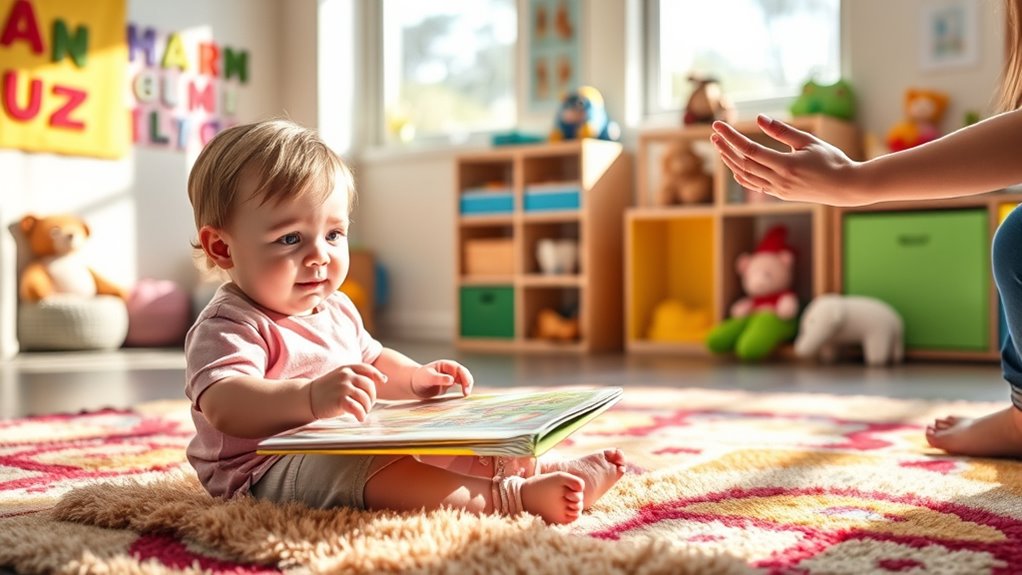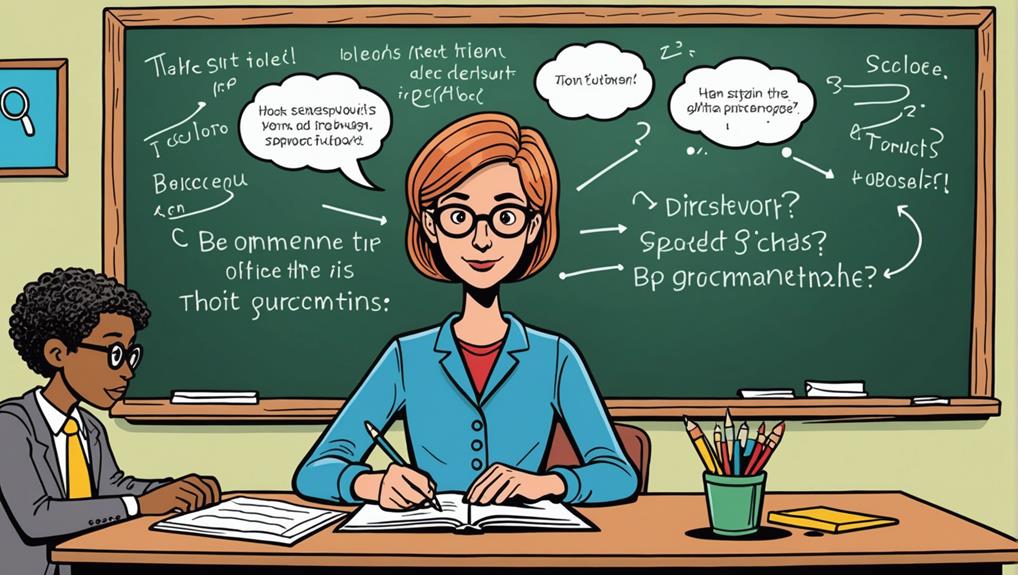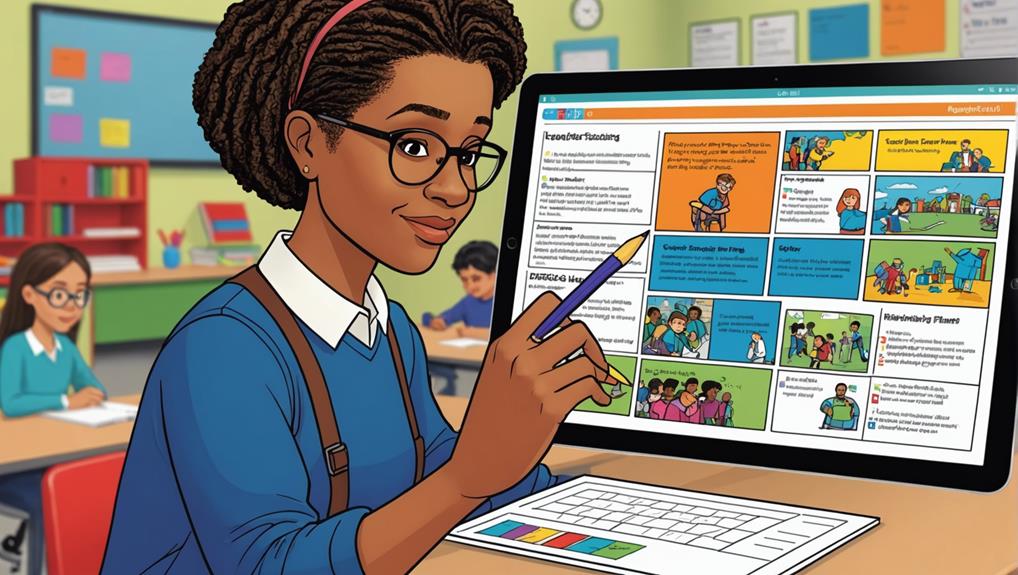Understanding your child’s language development helps you support them effectively. From the early months, they begin with cooing and simple vocalizations. Around a year, they start babbling, imitating sounds, and using gestures. As they approach their second birthday, they begin using individual words and then combine them into short sentences. During preschool years, their vocabulary and sentence complexity grow rapidly. If you keep exploring, you’ll find ways to encourage their communication skills at each stage.
Key Takeaways
- Babies start with simple cooing and vocalizations, gradually responding to social interactions to encourage sound differentiation.
- The babbling stage begins around 12 months, with repetitive consonant-vowel sounds like “ba” and “da.”
- Vocabulary expands rapidly during the first year, with children beginning to use words in context and linking them to objects or actions.
- Between ages 1-2, children combine words into simple two- or three-word phrases, laying the foundation for sentence formation.
- Preschoolers develop more complex sentences through practice, storytelling, and interactive activities, enhancing their overall language skills.
Early Vocalizations and Cooing

In the early months, your baby begins to produce simple sounds known as vocalizations and cooing. During this time, your responsiveness plays a pivotal role in encouraging their language development. When you respond promptly and positively to these sounds, your baby starts to associate their efforts with attention and encouragement. This interaction also helps them practice phoneme differentiation, the ability to distinguish between different speech sounds. As your baby experiments with various sounds, your engagement helps them refine their vocal skills. Keep in mind that every baby develops at their own pace, but your active participation fosters a supportive environment for early vocal exploration. Creating a positive environment where your baby feels safe to experiment with sounds is essential for their confidence and motivation to communicate. By creating a responsive atmosphere, you set the stage for your baby’s future language milestones. Additionally, understanding the importance of early vocalizations can guide you in supporting their ongoing speech development. Recognizing the significance of language development stages helps you better support your child’s progress.
The Babbling Stage

During the babbling stage, your baby begins to produce repetitive consonant-vowel sounds like “ba,” “da,” and “ma,” which are fundamental building blocks of speech. This stage helps develop phonemic awareness, allowing your child to recognize and differentiate sounds that will later form words. You may notice your baby imitating gestures, like waving or pointing, which supports their understanding of communication. Babbling also encourages your baby to experiment with voice and sound patterns, laying the foundation for spoken language. This stage isn’t just about sounds; it’s a critical time for your baby to practice the rhythm and melody of language. By engaging with your baby during babbling, you’re helping them refine their ability to process sounds and imitate gestures, setting the stage for future speech development. Regular practice during this period can enhance their language acquisition skills, fostering better communication as they grow. Recognizing the significance of early communication skills can guide parents in supporting their child’s language journey. Additionally, engaging in responsive interactions with your baby during this stage can further reinforce their developing speech and language abilities.
First Words and Vocabulary Growth

You’ll notice your child begins to say their first words, marking an exciting milestone. As their vocabulary grows, they reach key milestones like naming objects and actions. Soon, you’ll see them use words in specific contexts, showing their understanding of language. Recognizing these early stages of speech development helps support their overall language development stages. Engaging in early language interventions can promote more effective communication skills as they grow, and understanding the importance of vocabulary growth can guide parents in supporting their child’s language journey effectively.
First Words Emerge
As your child approaches their first birthday, you’ll notice their vocabulary begins to expand rapidly. During this stage, first words emerge as they connect sounds with meanings. Language acquisition theories suggest that a combination of innate abilities and social interaction impacts this development. Your child’s environment plays a key role—talking, reading, and engaging with others help reinforce word learning. You might see them say simple words like “mama,” “dada,” or “ball,” often with intentional meaning. These early words mark a significant milestone in their language journey. By actively interacting and responding to their attempts at communication, you support their growing vocabulary and confidence. Additionally, understanding the stages of neural network development can provide insights into how their brain processes and stores new words. Engaging in social interaction not only encourages vocabulary growth but also helps build their confidence in communication. Moreover, providing a variety of language-rich environments enhances their exposure to new words and concepts, further supporting their speech development.
Vocabulary Expansion Milestones
Have you noticed your child’s vocabulary suddenly expanding? This is a key milestone in language development, often happening around their first year. During this stage, children begin to use more words and understand others better. Speech therapy techniques can support this growth, especially if your child faces delays. For bilingual children, vocabulary expansion may seem slower initially, but they often develop strong skills in both languages over time. You can encourage their growth by naming objects, reading aloud, and engaging in conversations. Remember, consistency and patience are essential. As your child’s vocabulary grows, you’ll see them start to combine words into simple sentences, laying the foundation for more complex language skills. This milestone is exciting and marks a significant step in their communication journey. Additionally, understanding the stages of prophetic dreams can deepen awareness of subconscious processes that influence language and thought development. Recognizing language acquisition patterns can also help caregivers tailor their support to better match the child’s developmental needs. Moreover, being aware of vocabulary expansion milestones can help parents celebrate progress and identify areas where additional encouragement may be beneficial.
Contextual Word Use
When do children start using their first words in meaningful ways? Usually, around 12 months, your child begins to connect words to specific objects or actions. During this stage, gestural communication plays a key role, as pointing or waving helps them express needs before full words develop. As their vocabulary grows, they become better at context-based word interpretation, understanding words depending on the situation. For example, they might say “milk” when they want it or point to a bottle. This ability shows they’re starting to use words with intention, linking language to real-life contexts. You’ll notice their first words are often simple, but they’re actively learning to communicate effectively by combining gestures and sounds to make meaning clear.
Combining Words and Simple Sentences

During the stage of language development when children start combining words, they quickly learn to connect simple ideas into more meaningful expressions. You’ll notice your child experimenting with two- or three-word phrases, like “want juice” or “big dog.” Nursery rhymes and storytelling techniques play a crucial role here, as they introduce rhythm and repetition that help children grasp sentence structure. Repeating familiar rhymes encourages your child to mimic sounds and words, building confidence in combining different elements. As they practice, they begin forming simple sentences, which express their needs and observations more clearly. This stage marks an important step toward more complex language skills, setting the foundation for future vocabulary expansion and better communication. Recognizing farmhouse decor styles can also inspire fun and sophisticated ways to refer to pets as they develop language skills. Understanding language development stages can help parents support their child’s growing communication abilities effectively.
Expanding Language Skills in Preschool Years

During the preschool years, your child’s vocabulary can expand rapidly, opening new ways to express ideas. They also improve their sentence construction skills, making their speech more detailed and accurate. Providing chances for conversation helps them practice and solidify these skills, boosting their confidence and communication abilities.
Vocabulary Growth Milestones
Have you ever wondered how preschoolers rapidly expand their vocabulary? During these years, they learn hundreds of new words, boosting communication skills. Typically, children acquire around 10 new words weekly. Here’s a quick look:
| Milestone | Description |
|---|---|
| Vocabulary Explosion | Rapid growth in word knowledge, including bilingual vocabulary. |
| Recognizing Synonyms | Understanding words with similar meanings. |
| Overcoming Language Delay | Some children may experience delays, but support helps catch up. |
Your child’s vocabulary growth varies, especially if they’re bilingual or facing a language delay. Celebrate milestones and provide rich language exposure. This stage sets the foundation for more complex language skills ahead.
Sentence Construction Skills
As preschoolers develop their language skills, they begin to combine words into simple sentences, laying the groundwork for more complex communication. This stage marks significant progress in syntax development, where children start to understand and apply basic grammatical rules. They learn to order words correctly and use simple sentence structures, which helps convey their needs and ideas effectively. Pragmatic language also plays a key role, as they become more aware of social cues and appropriate ways to communicate in different settings. During this period, children experiment with language, often making errors, but each attempt helps refine their sentence construction skills. Supporting children’s language development by modeling clear sentences and encouraging your child’s expressive language can help them build confidence and fluency. Additionally, understanding and implementing sentence construction skills can significantly accelerate their ability to form meaningful and accurate sentences.
Conversation Practice Opportunities
Engaging your preschooler in regular conversations provides valuable opportunities to expand their language skills. Encouraging dialogue helps them practice new words, sentence structures, and communication skills. You can boost their development through activities like interactive storytelling, where they actively participate in creating stories, and peer language activities, which promote learning from friends. These interactions make language practice meaningful and fun. To maximize these opportunities:
- Use interactive storytelling to involve your child in story creation
- Arrange playdates focused on peer language activities
- Ask open-ended questions to encourage detailed responses
These methods foster confidence in speaking and expand vocabulary, setting a strong foundation for future language growth. Consistent practice in these areas helps your preschooler develop more complex sentences and better conversational skills.
Supporting and Encouraging Language Development

Wondering how to boost a child’s language skills? One effective way is through beneficial reading. Choose age-appropriate books and read with enthusiasm, pointing out pictures and asking questions to engage your child. This encourages vocabulary growth and comprehension. Additionally, interactive play is essential; use toys, role-playing, or everyday objects to spark conversations. Talk to your child during activities, narrate what you’re doing, and listen to their responses. Make language fun and relevant to their interests, which motivates them to communicate more. Praise their efforts to build confidence. Consistent, supportive interactions create a rich language environment, helping your child develop essential skills needed for more complex sentences and conversations.
Frequently Asked Questions
How Can Parents Tell if Their Child’s Language Delay Is Normal?
You can tell if your child’s language delay is normal by observing their progress toward typical language milestones. If they aren’t babbling by 6 months or saying simple words by age 2, consider consulting a speech therapist. Regularly engaging in conversation helps. If delays persist or worsen, early speech therapy can support development. Remember, some variation is normal, but timely intervention guarantees your child reaches language milestones comfortably.
What Are Common Signs of Language Development Issues?
You might notice your child’s language development issues if they aren’t reaching key milestones, such as babbling, forming simple words, or combining words into sentences. Watch for signs like limited vocabulary, difficulty understanding instructions, or trouble imitating sounds. If these signs persist, consider seeking speech therapy early. Addressing these issues promptly helps your child develop communication skills, build confidence, and enjoy better social interactions.
When Should a Child Start Reading and Writing Skills?
You should expect your child to start reading and writing skills around age 4 to 5, with reading milestones like recognizing letters and simple words. Writing readiness varies, but many children begin forming letters and their own words by age 5 or 6. Keep encouraging early literacy activities, and watch for signs of progress, like holding a pencil properly and showing interest in books. Every child develops at their own pace.
How Does Bilingualism Affect Language Development Stages?
Oh, the joys of bilingualism—where your child masters code switching and language mixing like a pro! It might seem chaotic at first, but it actually boosts their understanding of language nuances. They’ll develop flexibility in language use, which can slightly delay milestones, but ultimately, they become more adept communicators. So, instead of worrying, celebrate their linguistic juggling act; it’s a sign of cognitive growth, not confusion.
What Activities Best Promote Advanced Language Skills?
You can promote advanced language skills by engaging in interactive storytelling, which encourages your child to participate actively and think creatively. Using open-ended questions during stories helps expand their vocabulary and comprehension. Additionally, reading together regularly exposes them to new words and sentence structures, fostering language development. Incorporate diverse topics and encourage your child to express their thoughts to strengthen their communication skills effectively.
Conclusion
As you watch your child’s language blossoms unfold, remember each stage is a unique brushstroke in their communication masterpiece. From playful babbles to soaring sentences, you’re guiding their voice to sing loudly and clearly. Embrace every word and stumble as precious seeds of confidence, nurturing a future where their words take flight like butterflies. With patience and love, you’ll see their language grow into a vibrant garden of expression, full of endless possibilities.









